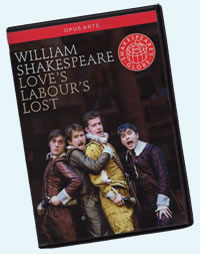Love’s Labour’s Lost
Laboring for Love
 Opus Arte/Shakespeare’s Globe(2010)
Opus Arte/Shakespeare’s Globe(2010)
Directed by Dominic Dromgoole, Ian Russell. Trystan Gravelle, Philip Cumbus, Michelle Terry, Thomasin Rand, Paul Ready.
Traditionalists will love this Love’s Labour’s Lost, presented in Elizabethan costume and filmed in performance at the replica Globe Theatre in London. This is “pure Shakespeare.” That, I believe, is its major weakness, but maybe I’m being too much a snob.
Love’s Labour’s Lost has some incredibly funny moments, the running joke being people using language pretentiously. That humor is carried out on several levels: the affected scholarship (and later affected love poetry) of Navarre and his court, the overblown grandiloquence of Don Armado, the elitist intellectualism of the schoolmaster and curate, and the wordplay of Moth, Costard, and the Princess and her train. Much of the last, the wordplay humor, I find too obtuse and simply don’t get, but the rest is fuel for great comic performances.
This production has comic performances, but little of it is drawn from the text. Most of the laughs are generated by stage business with spurious connection to the lines, and by mugging that may or may not be physical manifestations of the spoken jokes. The disconnect between the humor of the script and the humor of the performance is best exemplified by Paul Ready’s portrayal of Don Armado. Ready is sweetly funny, his Don Armado quixotically raptured in his love and his life; but, as humorous as he is, Ready’s Don Armado is nothing like the man who wrote his two letters in the play. What a missed chance for an actor when his character’s funniest scenes take place without him even on stage.
My greatest frustration was watching the scenes featuring Holofernes and Sir Nathaniel. Christopher Godwin and Patrick Godfrey, respectively, are adequately pretentious as schoolmaster and curate, and there is even a touching moment when Sir Nathaniel feels genuinely insulted by Holofernes telling him he was wrong to give any merit to Berowne’s verses. However, in these great scenes, the audience (American tourists? school groups?) hardly laughed, and the fault may have been the Elizabethan costuming. Holofernes and Nathaniel are as contemporary to today's audiences as any characters Shakespeare created, but if they are in Tudor robes and collar ruffs speaking their supercilious lines and Latin, it probably sounds to the uninitiated “like Shakespeare.” Put them in vests and bowties and their pretentions become obvious to modern audiences who don't know this play. Maybe I’m being too like Holofernes in my own attitude toward the audience at the filming but, in my observation, Godwin and Godfrey died on that stage through no fault of their acting.
Much of the rest of the cast fares better, even if they can only accomplish audience love through their charm and clowning (respectively, Seroca Davis as Moth and Fergal McElherron as Costard) rather than the lines spoken. Rhiannon Oliver attracts a worthy spotlight on Jaquenetta, especially in the letter scene when she becomes overly affectionate with Sir Nathaniel, inspired by his reading Berowne’s misdirected love sonnet. This Jaquenetta is so sweet and forward, we not only see how she gets the sluttish reputation she has, but how Don Armado can become so smitten.
Trystan Gravelle brings his Welsh lilt and a cheeky attitude to Berowne as, glint-eyed, he linguistically navigates his way around previous oaths, vows, and principles to arrive at a desirable path to his goal of scoring with Rosaline. No wonder: Thomasin Rand’s Rosaline is not just witty, but sexily so, a performance that alone makes watching this DVD a treat. Philip Cumbus plays Navarre as self-consciously serious, but Michelle Terry’s Princess displays a sour disposition and seething dislike for just about anybody on stage, but then she suddenly breaks into outlandish merriment by leading the charge in a food fight at the end. Her uneven performance suddenly turns brilliant when Mercade arrives to deliver the news of her father’s death. Terry is moved to tears but still tries to hold a regal bearing, and it is her serious but gentle assertions to Navarre that provides the perfect tone for the year-and-a-day vows that follow.
Finally, here’s a shout-out to Andrew Vincent as Dull in a part that also doubled as the Forrester. In his conversation with Holofernes about what the Princess killed, Vincent repeats the word “pricket” with such forceful pride and growing irritation as to signal for the audience just who is the real fool in this conversation (after all, Dull was there when she shot the “pricket”). Meantime, he delivers what is surely Shakespeare’s most telling joke in this play, when at the end of V.1—a scene featuring not only Holofernes and Sir Nathaniel but also Armado, Moth, and Costard—Holofernes notes that Dull “hast spoken no word all this while.” Replies Dull representing all of us: “Nor understood none, neither, sir.”
The play opens with a clever and cute dumbshow comprising two large puppets of a stag and doe “courting.” This promises much in the way of theme and device, but is only revisited when the Princess kills one of the deer in her hunt, a bit of questionable stage business that only entices a chagrined “awwww” from the audience. Meantime, other useless stage business sucks the true humor out of even the 50 percent or so of this play’s lines that are still funny 400 years on. Nevertheless, as there are too few worthy Love’s Labour’s Losts for your home entertainment system, this will certainly suffice as a capably performed filmed version of this witty play.
Eric Minton
May 31, 2011
Comment: e-mail [email protected]
Start a discussion in the Bardroom



 Find additional Shakespeareances
Find additional Shakespeareances